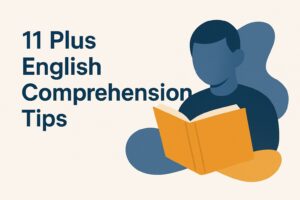
How To Prepare For 11 Plus Verbal Reasoning
Getting ready for the 11 Plus exam can feel overwhelming, especially when it comes to 11 Plus verbal reasoning. But don’t worry! Understanding this crucial component can open doors to your child’s academic future.
We’ll explore what verbal reasoning is, why it’s important, and share tried-and-true preparation strategies. Plus, you’ll discover valuable resources and effective practice techniques that will boost confidence and skills. Ready to dive in and pave the way for success? Let’s get started!
What is the 11 Plus Exam?
The 11 Plus exam, commonly administered in the UK, typically assesses students through sections on verbal and non-verbal reasoning, mathematics, and English. This examination evaluates a child’s aptitude for secondary education.
This exam acts as a gateway to selective grammar schools, with a pass rate of approximately 60% often seen in competitive regions. It consists of around 100 questions distributed across the four sections, with each section allocated a time frame of 45 minutes to an hour.
Preparation for the 11 Plus exam can play a crucial role in shaping a student’s educational journey, influencing their access to high-performing schools. Parents frequently utilise resources such as:
- Past papers
- Online practice tests
- Tutoring services
to support their children’s success.
Employing structured study plans that integrate these resources can effectively enhance a child’s confidence and performance.
Importance of Verbal Reasoning
Verbal reasoning skills play a vital role in achieving success in the 11 Plus exam. They not only assess language proficiency but also evaluate critical thinking and problem-solving abilities.
Developing strong verbal reasoning skills can lead to significant improvements in academic performance. Research shows that students who excel in this area often achieve scores that are 10-15% higher on standardised tests.
For instance, engaging with reasoning exercises found in resources like “The Bond 11+ Verbal Reasoning” book can effectively strengthen these skills.
Additionally, utilising online platforms such as Khan Academy or IXL provides students with the opportunity to interact with various verbal puzzles and tasks specifically designed to enhance logical deduction. This is essential for fostering a solid foundation for future learning across all subjects.
Understanding Verbal Reasoning

Understanding the various types of verbal reasoning questions is essential for effective preparation and achieving a competitive score in the 11 Plus exam. It is important to familiarise oneself with these question types to enhance one’s performance and confidence in the test. For those crafting their preparation strategy, knowing what should be in an 11 Plus study plan can be immensely beneficial.
Types of Questions
The 11 Plus verbal reasoning section generally comprises various question types, including synonyms, antonyms, analogies, and comprehension questions. Each of these is designed to assess specific language skills.
Synonyms and antonyms evaluate a student’s grasp of word meanings and relationships. For instance, recognising that “happy” is a synonym for “joyful” is a key part of this assessment. Analogies require students to identify patterns, such as understanding that “cat” is to “kitten” as “dog” is to “puppy.” Comprehension questions focus on the ability to understand and interpret brief passages.
Engaging with these types of questions through resources like free online quizzes or verbal reasoning workbooks can greatly enhance a student’s performance, ensuring they are well prepared for the exam.
Common Formats
Verbal reasoning questions frequently take on multiple-choice formats, cloze tests, and sequence questions, each necessitating distinct strategies for effective resolution.
In multiple-choice formats, you will typically encounter an initial statement followed by several possible answers. To perform well, it is advisable to read through all the options carefully before making a selection.
Cloze tests present passages with omitted words, and here, it is beneficial to practice predicting the missing words based on context and grammatical clues.
When tackling sequence questions, pay attention to the logical relationships or thematic continuity among the statements. Utilising the process of elimination can also be highly beneficial, as it significantly increases the likelihood of identifying the correct answer.
Preparation Strategies
Developing a well-structured preparation strategy is crucial for mastering the verbal reasoning component of the 11 Plus exam and achieving the best possible results. For those looking to craft an effective study plan, our comprehensive guide on what should be in an 11 Plus study plan offers essential insights.
Creating a Study Schedule
An effective study timetable should ideally allocate a minimum of 10 to 15 hours each week in the lead-up to the exam, placing a strong emphasis on verbal reasoning practice and review.
To create a personalised study timetable, begin by identifying the specific verbal reasoning skills you aim to enhance, such as comprehension, analogy, or logic. It would be beneficial to dedicate 2 to 3 hours each week to practise each skill, allowing ample time for review.
For example, a typical weekly timetable could look like this:
- Monday – 2 hours of reading comprehension
- Wednesday – 2 hours of analogies
- Saturday – 3 hours for logic puzzles
Additionally, it is advisable to incorporate 1 hour of review during each session to reinforce what you have learned, making adjustments as needed along the way.
Setting Realistic Goals
Setting realistic goals, such as aiming to improve practice test scores by 10% each month, is a great way to maintain motivation and create clear benchmarks for progress.
To effectively implement goal setting, it is important to start by identifying specific areas that need improvement, such as mastering algebra concepts.
From there, you can break this down into measurable short-term goals, such as completing a minimum of two practice problems each day or dedicating an hour each week to review sessions.
Utilising tools like habit-tracking apps, such as Habitica or Todoist, can help you monitor your progress consistently.
Additionally, scheduling monthly assessments will allow you to evaluate your improvements and adjust your strategies as needed, ensuring you remain on track to achieve your overall learning objectives.
Resources for Study

There are numerous resources available to assist students in their preparation for the verbal reasoning component of the 11 Plus exam. These include books, online courses, and mobile applications, all designed to enhance their skills and confidence. If you’re interested in boosting your child’s performance further, you might find our 11+ Comprehension Tips helpful, offering strategies to support their success.
Books and Guides
Books like 11 Plus Verbal Reasoning Practice Papers by CGP and How to Pass the 11 Plus by Andrew H. serve as excellent resources for those looking to master verbal reasoning.
Another noteworthy title is The 11+ Survival Guide by David McNaught, which is priced around £14.99. This book focuses on strategic tips and time management techniques, and many parents appreciate its clarity and straightforward approach.
Additionally, Verbal Reasoning Workout for the 11+ by Richard Atkins, priced at £19.99, offers extensive practice questions accompanied by detailed explanations. This makes it ideal for honing analytical skills.
Lastly, 11+ English Revision Guide by Letts is available for £9.99 and emphasises comprehension and grammar, earning high praise for its user-friendly layout.
Each of these books provides targeted practice aimed at helping students excel in verbal reasoning assessments.
Online Courses and Practice Tests
Online platforms such as Bond Online and Atom Learning provide comprehensive courses and practice tests, delivering interactive and adaptive learning experiences for students.
Bond Online, in particular, focuses on adaptive learning pathways, enabling students to concentrate on areas where they require improvement. For instance, its algorithm analyses performance to identify weaker subjects and customises quizzes to enhance understanding in those specific areas.
On the other hand, Atom Learning incorporates gamified assessments designed to boost engagement, making it easier for younger students to remain motivated. The pricing for these platforms generally starts at around £30 per month, making them accessible to a wide range of learners.
By utilising these resources, students can develop a balanced study plan that optimises both understanding and retention.
Apps and Software
Applications such as ‘11 Plus Verbal Reasoning‘ (£4.99) and ‘SATS Companion’ (£9.99) offer engaging practice opportunities and effectively track student progress in verbal reasoning skills.
These apps provide valuable flexibility in learning, allowing students to study from virtually anywhere.
For instance, ‘11 Plus Verbal Reasoning‘ features customised quizzes that adapt to each student’s individual skill level. Meanwhile, ‘SATS Companion‘ includes timed practice tests designed to simulate real exam conditions, which helps students develop better time management skills.
Both apps also come with progress tracking features, making it easy for parents and teachers to monitor students’ achievements.
Incorporating these tools into a daily study routine can significantly enhance students’ comprehension and confidence, particularly as exam periods draw near.
Practice Techniques
Utilising effective practice techniques can greatly improve a student’s performance in the verbal reasoning section of the 11 Plus exam. Related insight: When Should You Start Preparing for the 11 Plus Exam?
Timed Practice Sessions
Conducting timed practice sessions that closely mimic examination conditions can significantly boost students’ confidence and enhance their time management skills.
To optimise the effectiveness of these timed practice sessions, consider implementing the Pomodoro technique. This method involves practising for 25 minutes, followed by a 5-minute break. After completing four of these sessions, it is beneficial to take a longer break of 15 to 30 minutes.
Using a timer app like Forest or Focus@Will can assist in minimising distractions during these periods.
It is advisable to schedule these sessions three to four times a week, gradually increasing the duration as comfort levels improve. This approach not only builds endurance but also aids in adapting to pacing under pressure, ultimately preparing students for examination scenarios.
Mock Exams
Taking mock examinations under realistic test conditions offers invaluable experience, allowing students to become familiar with the examination format and types of questions they will encounter.
To effectively organise mock examinations, one should begin by gathering resources such as past papers or sample questions relevant to the specific examination. It is important to allocate dedicated time slots that reflect the actual duration of the examination, ensuring that students practise under appropriate pressure.
After each mock examination, it is beneficial to analyse the results by identifying strengths and weaknesses. This process may involve reviewing incorrect answers or assessing time management skills. Utilising tools like Google Forms can help create a structured environment for these tests, and encouraging group discussions afterwards can enhance collective understanding among students.
Reviewing Mistakes
Reviewing mistakes after practice sessions is crucial for identifying knowledge gaps and enhancing performance in verbal reasoning. To effectively analyse these mistakes, one should begin by maintaining a mistake log. This log should document each error along with the reason it occurred, which helps in recognising patterns over time.
Additionally, seeking feedback from peers or mentors regarding identified weaknesses is beneficial, as it allows for targeted practice. For example, if a recurring issue in logical deductions is noted, it would be wise to focus specifically on that area during the next practice session.
Utilising online resources, such as Khan Academy, for targeted exercises can further support the reinforcement of understanding and the enhancement of skill development.
Enhancing Vocabulary Skills

Enhancing vocabulary skills is essential for mastering verbal reasoning, as a strong vocabulary significantly influences both comprehension and reasoning abilities. When individuals expand their vocabulary, they not only improve their understanding of complex texts but also strengthen their capacity to reason through various concepts effectively. Worth exploring: 11+ Comprehension Tips for further guidance on expanding vocabulary and comprehension skills.
Reading Widely
Encouraging students to explore a variety of reading materials, including fiction, non-fiction, and newspapers, can greatly enhance their vocabulary and comprehension skills.
To promote diverse reading habits, it is advisable for students to choose texts that are both age-appropriate and slightly challenging. For example, a secondary school student may find value in contemporary fiction like “Wonder” by R.J. Palacio, which offers relatable themes, alongside a classic such as “The Adventures of Tom Sawyer,” which exposes them to different linguistic styles.
Additionally, introducing age-appropriate non-fiction, such as “National Geographic Kids” magazines or informative websites, can ignite their curiosity about the world. Engaging students in discussions about their readings can further deepen their understanding and help them make meaningful connections.
Using Flashcards
Utilising flashcards for vocabulary practice, such as those offered by Quizlet or Anki, can transform the process of learning new words into an engaging and effective experience.
To make the most of flashcards, it is advisable to place the word on one side and its definition or a sample sentence on the opposite side.
It is beneficial to review these flashcards daily, concentrating on new words while also revisiting older ones to reinforce memory retention.
For example, one could establish a schedule that involves reviewing new cards after one day, then again after three days, and finally after a week. This spaced repetition method is an effective strategy that aids in embedding vocabulary into long-term memory, making it significantly easier to recall during conversations or in writing.
Test Day Preparation
Effective preparation for test day is essential for students to perform at their best and manage anxiety during the 11 Plus examination.
By taking the time to get ready, students can approach the examination with confidence and clarity.
What to Bring
On the day of the exam, students should remember to bring essential items such as identification, stationery, a water bottle, and any permitted snacks to help maintain their energy levels.
It may be beneficial to pack a high-energy snack, such as a cereal bar or some nuts, to help sustain focus throughout the test. Additionally, carrying a watch can assist in managing time effectively.
It is important to have extra pens or pencils on hand to prevent any last-minute issues and to include a rubber if one prefers to use a pencil.
Organising these items the night before can greatly alleviate morning stress, allowing for the mental clarity needed to perform at one’s best.
Managing Test Anxiety
Managing test anxiety is essential for achieving optimal performance. Techniques such as deep breathing, visualisation, and thorough preparation can significantly reduce stress levels.
Here are a few exercises to consider incorporating into your routine:
- Begin with deep breathing for five minutes before the test. Focus on inhaling slowly through your nose and exhaling through your mouth to help centre yourself.
- Visualisation can also be quite effective. Imagine yourself successfully navigating the exam; this mental rehearsal can help build your confidence.
- Establishing a solid preparation routine is key. Review your material daily in manageable chunks to minimise the need for last-minute cramming.
- You might also want to use techniques like the Pomodoro Technique, which encourages focused study sessions followed by short breaks, enhancing both retention and a sense of calm.
Final Tips for Success
To achieve success, it is essential to maintain a positive mindset, engage in consistent practice, and utilise resources effectively to enhance verbal reasoning skills.
To effectively improve your verbal reasoning abilities, consider setting specific goals, such as dedicating 30 minutes each day to focused practice. Utilise tools like the Official GRE Verbal Reasoning Practice Questions for structured exercises, or explore online platforms such as Khan Academy for more interactive learning experiences.
Additionally, regularly engaging with a variety of reading materials—such as novels, articles, and essays—can help broaden your vocabulary and comprehension skills. It is also beneficial to reflect on your weekly progress and adjust your study strategies as necessary, ensuring that you remain motivated and focused on continuous improvement.
Frequently Asked Questions
What is 11 Plus Verbal Reasoning?
11 Plus Verbal Reasoning is a type of test used to assess a student’s ability to understand and manipulate language. It is commonly used as part of the 11 Plus entrance exams in the UK.
How can I prepare for 11 Plus Verbal Reasoning?
There are several ways to prepare for 11 Plus Verbal Reasoning. You can practice with past papers, take online practice tests, or attend preparatory classes. It is also helpful to read widely and broaden your vocabulary.
When should I start preparing for 11 Plus Verbal Reasoning?
It is recommended to start preparing for 11 Plus Verbal Reasoning at least a year before the exam. This will give you enough time to practice and become familiar with the types of questions that may appear on the test.
What skills are tested in 11 Plus Verbal Reasoning?
11 Plus Verbal Reasoning tests a student’s ability to think logically, understand and manipulate words and language, and make connections between words and ideas. It also assesses a student’s vocabulary, spelling, and grammar skills.
Are there any specific techniques for answering 11 Plus Verbal Reasoning questions?
Yes, there are some techniques that can help you answer 11 Plus Verbal Reasoning questions more efficiently. These include reading the question carefully, eliminating obviously incorrect options, and using context clues to determine the correct answer.
Can I improve my 11 Plus Verbal Reasoning skills even if I am not naturally good at it?
Yes, with practice and dedication, you can improve your 11 Plus Verbal Reasoning skills even if you are not naturally inclined towards it. Make a study plan, set aside time for regular practice, and seek help from resources such as practice books, online tests, and tutors. Since verbal reasoning is a key element in many exam formats, including ISEB, consistent practice will make a noticeable difference in your performance.



